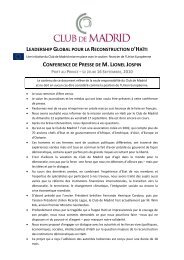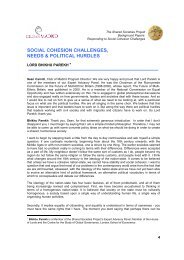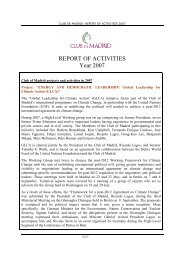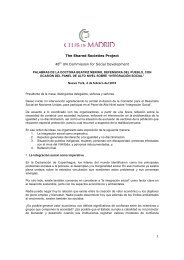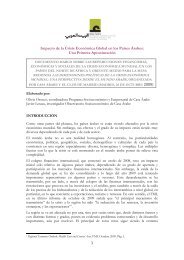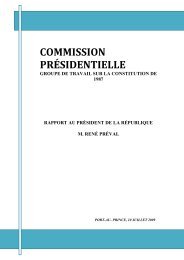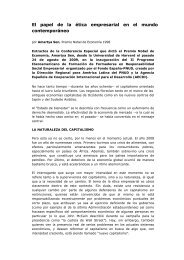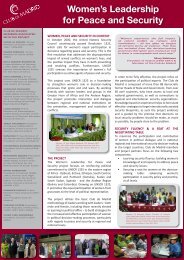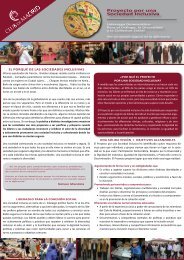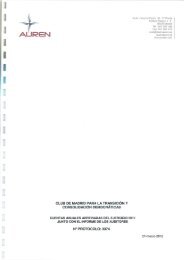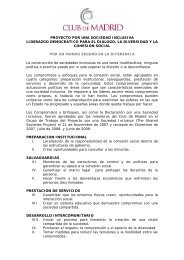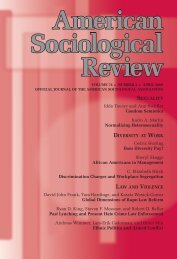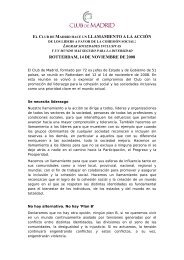Investing cultural diversity and intercultural dialogue - Business and ...
Investing cultural diversity and intercultural dialogue - Business and ...
Investing cultural diversity and intercultural dialogue - Business and ...
Create successful ePaper yourself
Turn your PDF publications into a flip-book with our unique Google optimized e-Paper software.
4<br />
What is needed is a<br />
new approach to<br />
<strong>cultural</strong> <strong>diversity</strong><br />
which takes<br />
account of its<br />
dynamic nature<br />
<strong>and</strong> the challenges<br />
of identity<br />
associated with<br />
<strong>cultural</strong> change<br />
I A billboard on Suva's<br />
main street, Fiji<br />
L A man playing a trumpet<br />
in the old French Quarter of<br />
New Orleans, US<br />
Another difficulty concerns the identification of the<br />
constituents of <strong>cultural</strong> <strong>diversity</strong>. In this connection, the<br />
terms ‘culture’, ‘civilization’ <strong>and</strong> ‘peoples’ have different<br />
connotations depending on context, for example<br />
scientific or political. Whereas ‘cultures’ refers to entities<br />
that tend to be defined in relation to one another, the<br />
term ‘civilization’ refers to cultures that affirm their values<br />
or worldviews as universal <strong>and</strong> adopt an expansionist<br />
approach towards those that do not (or do not yet) share<br />
them. It is therefore a very real challenge to attempt to<br />
persuade the different centres of civilization to coexist<br />
peacefully. As conceived by UNESCO – a conception<br />
remote from those ideological constructions that predict<br />
a ‘clash of civilizations’ – ‘civilization’ is to be understood<br />
as work in progress, as the accommodation of each of<br />
the world’s cultures, on the basis of equality, in an<br />
ongoing universal project.<br />
A third difficulty concerns the relationship of cultures to<br />
change. For it took almost seven decades of the 20 th<br />
century before cultures started to be understood as<br />
shifting entities. Previously, there was a tendency to view<br />
them as essentially fixed, their content being ‘transmitted’<br />
between generations through a variety of channels, such<br />
as education or initiatory practices of various kinds. Today,<br />
culture is increasingly understood as a process whereby<br />
societies evolve along pathways that are specific to them.<br />
The concept of difference aptly captures this particular<br />
dynamic, whereby culture changes while remaining the<br />
same. What is needed, then, is to define policies that give a<br />
positive slant to these ‘<strong>cultural</strong> differences’ so that groups<br />
<strong>and</strong> individuals that come into contact, rather than with -<br />
drawing into closed identities, discover in this ‘difference’<br />
an incentive for continuing to evolve <strong>and</strong> change.<br />
These considerations argue in favour of a new approach<br />
to <strong>cultural</strong> <strong>diversity</strong> – one that takes account of its<br />
dynamic nature <strong>and</strong> the challenges of identity associated<br />
with the permanence of <strong>cultural</strong> change. This necessarily<br />
entails substantial changes to UNESCO’s role in this<br />
context. For whereas the Organization’s longst<strong>and</strong>ing<br />
concern has been with the conservation <strong>and</strong><br />
safeguarding of endangered <strong>cultural</strong> sites, practices <strong>and</strong><br />
expressions, it must now also learn to sustain <strong>cultural</strong><br />
change in order to help individuals <strong>and</strong> groups to<br />
manage <strong>diversity</strong> more effectively. For this ultimately is<br />
the major challenge: managing <strong>diversity</strong>.<br />
I Women practising a<br />
traditional dance in<br />
Shanghai, China



